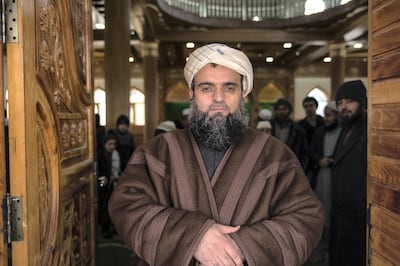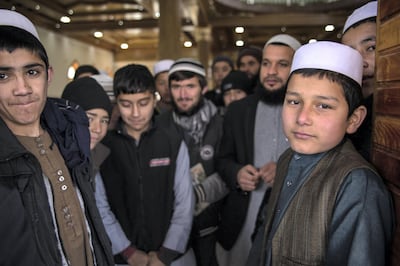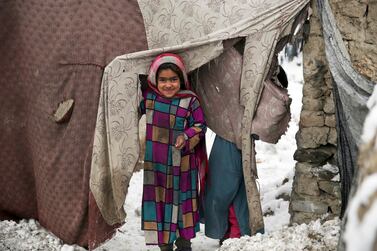Fazel Karim Saraji is not your typical climate activist. The turbaned, long-bearded man who wears a thick robe does not take to the streets to join protests, nor does he post his opinion on social media, yet his voice is widely heard.
Mr Saraji, 55, a father of seven, is a mullah and along with Friday sermons in his mosque in Afghanistan’s capital Kabul there are new topics being preached: climate change and protecting the environment.
Every week, hundreds of worshippers listen to his words and he is not the only one to introduce the environment into their weekly addresses. As Afghanistan faces grave implications of climate change, with droughts, floods and changing weather patterns, hundreds of religious leaders do their best bet to influence change.
“It’s our responsibility,” Mr Saraji said. “Our country has already been destroyed by war, we don’t want to also destroy our environment any further.”
Afghanistan has endured four decades of conflict and the US has had a military presence there since the fall of the Taliban in 2001.
Mr Saraji's lessons are simple, yet practical: watch your use of plastics, recycle what you can, swap car journeys for public transport and don’t burn toxic waste. “Essentially, don’t kill yourself or your environment through irresponsibility,” he said.
Mr Saraji oversees about 7,000 registered mosques across the country and encourages people to share the message about climate change.

Situated in Central Asia and the Hindu Kush Mountains, Afghanistan is heavily affected by global environmental changes. The UN said about 250,000 people were displaced by drought in western Afghanistan in 2018, with flash floods killing dozens last year.
More flooding is expected soon as spring approaches and large quantities of snow melt.
Much of the country’s landscape has been scared by the decades of violence. In the 1960s, Afghanistan had about 3.5 million hectares of forest, but only one million remains, according the UN’s Food and Agriculture Organisation.
“Only 1.5 per cent of the country is covered by forests now,” the agency’s representative in Afghanistan, Rajendra Aryal, said.
The Afghan government is trying to improve these figures and is in the process of planting 24,000 trees in Kabul province, but the region is also battling other difficulties.
The city produces between 2,500 and 2,800 metric tonnes of rubbish a day, much of which ends up in the capital's only landfill site. Air pollution, especially during the winter months when people heat their houses with coal, wood or by burning plastic, causes breathing issues and respiratory tract infections that affect thousands. More than 3,000 people die each year from pollution-related illnesses in Kabul alone, the Ministry of Public Health said.
“The problem is that we’re putting a lot of budget into the war. If we were to invest in our environment instead, and in the planting of trees, we could improve our lives drastically,” Mr Saraji said. “Of course, other, richer countries have a huge responsibility as well when it comes to protecting our environment, and they cause much of the damage.”
Afghanistan’s National Environmental Protection Agency estimates about 70 per cent of the country’s national budget is spent on security and defence, with less than 1 per cent going to the country's environmental agency.

Mullah Qary Samiullah said he was fed up with the government for failing to step up.
“The government should talk about it more,” he said. “We reach people through the mosques, but there are many other ways, including television advertisements, online commercials or even text messages.”
Mr Samiullah, 50, teaches classes in the heart of Kabul at Ismail Sabiullah madrassa, which is attended by about 200 girls and 300 boys. During the week the children arrive early in the morning, barely after the Sun has risen, studying religious books and, as of recently, the environment.
“It’s a chance to start them young,” Mr Samiullah said. “The holy Quran has many messages about the environment and human life. God made our nature and the Prophet Mohammed told us to take care of it.”
He encourages his students to take action, regardless of how small.
“I tell them that change starts at home. If they avoid using plastic and keep the city clean, that’s a great first step.”
Fazal Hussaini, the spokesman at Afghanistan’s Ministry of Religious and Hajj Affairs, said an increasing number of religious leaders became climate activists as they considered taking care of the planet to be important to their faith.
“It’s a crucial issue, it is also in Islam, and the lessons we hold are bearing fruit. It’s very clear that we are supposed to look after our environment. It’s our job as religious leaders.”
Mohammed Taqi, 13, a pupil at Mr Saraji's mosque, said he was scared the country's leaders were making decisions today that were bad for his generation's future.
“Our mullahs tell us that young people are important. Maybe we can help make our country clean and beautiful again.”






